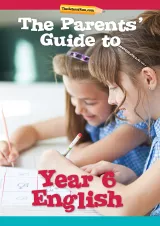
The Parents’ Guide to Year 6 English is the perfect resource to help you support your child's English learning at home. With clear guidance in each area of the English curriculum, you'll have the tools at your fingertips to help your child improve.
Making good progress in English has always been incredibly important, but it becomes even more so in Year 6. Not only is English a pivotal subject in itself, but the ability to write well and engage fully with different texts is key to doing well in all academic subjects at secondary school level. This is the year when your child must demonstrate that they have mastered a variety of writing styles, can tackle challenging comprehension questions and have a strong grasp of grammar, punctuation and spelling. But what exactly are teachers looking for? What level does your child have to reach to perform well in KS2 English SATs? And what exactly can you, as a parent, do to help?
Since your child started school, you will have been told how crucial reading is, and how you must encourage your child to read as much and as widely as possible. But as KS2 teacher and author of The Parents' Guide to Year 6 English Alice Hart points out, a lot of parents aren't clear about the level their Year 6 child is expected to be reading at, so they struggle to support their child's continuing development at home. And they don't feel equipped to help them improve their writing or comprehension skills either. But all that will change when you start to work through this eBook with your child.
Each section contains a story, non-fiction text or poem, which is then followed by reading comprehension questions written in the same style as those found in the SATs. You are then given example answers which you can use to mark your child’s work and also to help them to improve their answers.
Each section also contains a follow-up writing task, so that your child is given the opportunity to write a similar piece of writing to the one they have just read. The tasks are designed to build up vital writing skills, including planning, gathering ideas and drafting. You are also given a sample piece written by a Year 6 child, along with suggestions on how that particular piece of work could be improved. This is designed to help you, as a parent, understand how to help your child develop their writing skills.
By working through each of the exercises in the eBook at home with your child, you'll:
- Understand how to answer reading comprehension questions to gain maximum marks.
- Grasp the criteria used to assess the quality of a piece of written work.
- Learn a range of techniques to improve the level of a piece of written work.
- Become familiar with different types of texts that your child might need to interpret or write.
Since the introduction of the Grammar, Punctuation and Spelling test in 2013, teachers will now spend time in lessons purely focused on developing these skills, as opposed to just incorporating them into other elements of English teaching. Children now have to be able to identify a whole list of grammar terms (some of which even we parents will be unfamiliar with). For example, your Year 6 child will have to know:
- What is a determiner?
- What is the difference between a subordinating and a co-ordinating conjunction?
- What is the present progressive tense?
- What is a fronted adverbial?
- Plus prepositional phrases, modal verbs, ellipsis, root words...
It may seem like a very long and daunting list, but your child will be working through this part of the curriculum over six years! In the run-up to KS2 SATs, though, a short session on grammar, punctuation and spelling every day at home will really help to consolidate their knowledge and boost their confidence.
In The Parents' Guide to Year 6 English we explain all the terms your child will be taught in KS2 English and will need to learn in preparation for the Year 6 SATs Grammar, Punctuation and Spelling test. We also provide lots of suggested activities to try at home to ensure your child has fully grasped the meaning of each term.